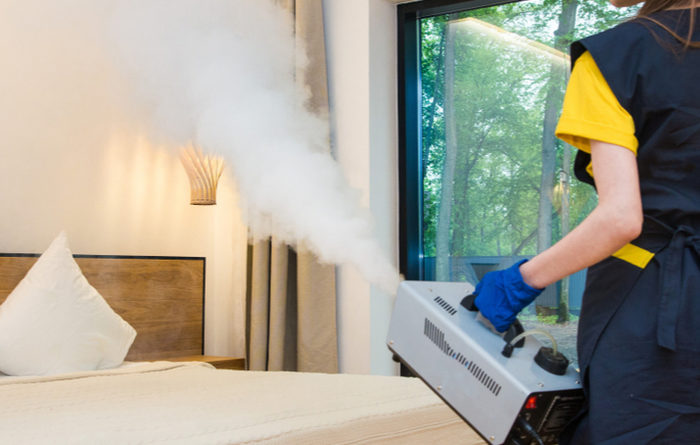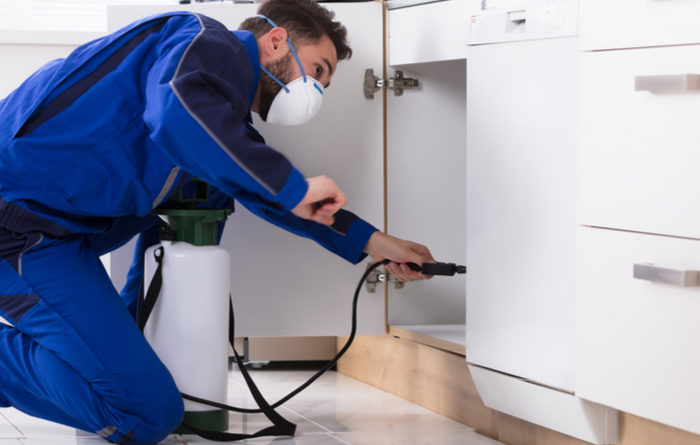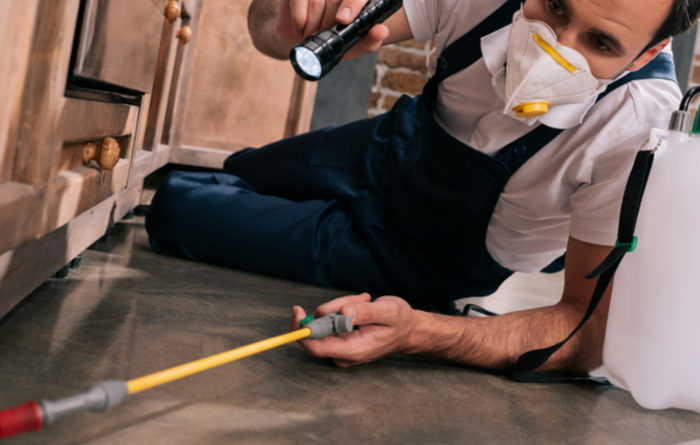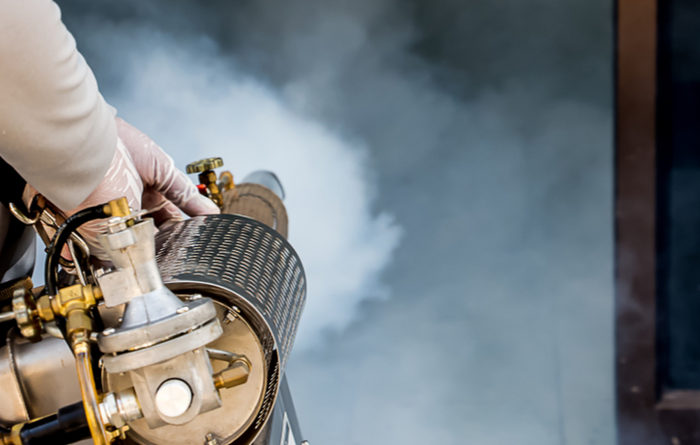How Long After Fumigation Is It Safe?
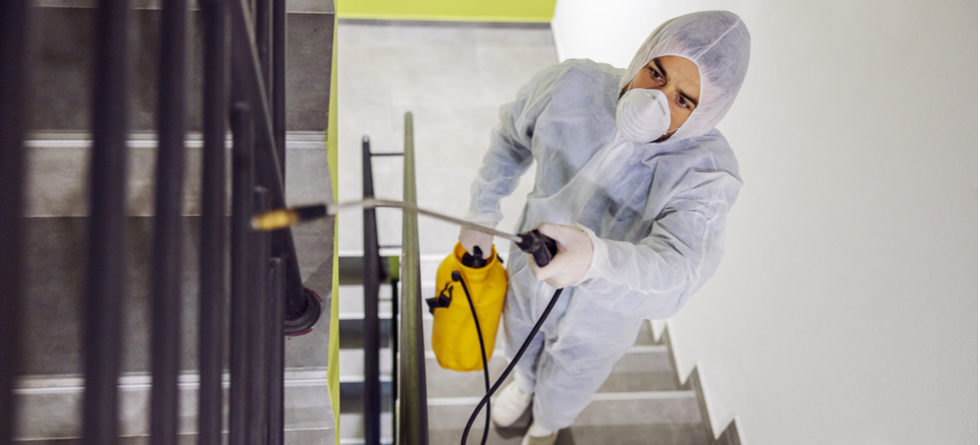
The fumigation process is generally a three-day affair. The first day the tents go on and the fumigant is introduced into the site. The second day the tents come off and the structure begins to aerate. Then, typically, on the third day the structure’s air quality is tested to make sure all the fumigant is gone and that it is safe for reentry.
Why Do I Have Roaches In My Clean House?
People often think that roaches only infest a dirty home, however, this is not the case. Roaches, much like humans, are more in need of water then they are of food. In fact, the American Roach can live almost 2-3 months without food. Typically, you will find roaches in the kitchens and bathrooms because of the water source.
How Do I Prepare My House For Tenting?
The fumigation company should give you a detailed list of all the items that are necessary to prepare your home for a fumigation. These include interior items such as bagging up all your food items into special bags, turning off gas if there are pilot lights. On the exterior you may need to rake back rock or mulch if it will interfere with the tarp on the ground. A good fumigation company will not only give you a detailed list, but will hold a pre-fumigation meeting to ensure that you are fully prepared for your fumigation.
Is Fumigation Harmful To Humans?
When done correctly and following all regulations, tent fumigations are safe, however, if an individual enters the fumigated structure before it has been cleared by the fumigation company, then yes it would be harmful.
How Often Should Fumigation Be Done?
It depends on how common drywood termites are in your area. Typically homes only need to be tented once, however, if neighborhoods of high termite activity it might be necessary to fumigate once every 10-15 years.
Is It Dangerous To Live Next To A Tented House?
No, the fumigant (gas) is accumulating to high levels underneath the tent, not outside of it. Even when the tents are taking off and the home is aerating, the fumigant cannot reach dangerous levels unless it is contained, therefore, you are not at any risk, as long as you are not under the tent or do not prematurely enter a home that has been tented.
Can Fumigation Make You Sick?
Fumigations can only make your sick if you enter a structure prematurely. Fumigators have to measure the air quality before they release the home back to you.
What Do I Need To Remove For Fumigation?
Prior to the fumigation, you will receive a list of items that need to be removed from your home by your fumigator. In general, you need to remove all food items or store them in special bags designed to hold food items during the fumigation process. In addition, all people, pets and plants obviously need to be removed and certain mattresses which are encased in permanent waterproof coverings, may need to be removed. A reputable fumigator should not only provide you a list, but also perform a thorough inspection and hold a meeting with you to ensure that you are fully prepared.
How Long Does Fumigation Smell Last?
The fumigant is a pure gas and therefore there is no odor or smell from the gas. A warning agent (typically chloropicrin) is introduced to the house as well, and occasionally, this product can have a residual smell. If all goes according to plan there will be no chloropicrin smell by the time you return to your home.
Does Fumigation Leave A Smell?
The fumigant is a pure gas and therefore there is no odor or smell from the gas. A warning agent (typically chloropicrin) is introduced to the house as well, and occasionally, this product can have a residual smell. If all goes according to plan there will be no chloropicrin smell by the time you return to your home.
What Do You Clean After Termite Tenting?
After a fumigation, the only thing you will need to clean up is the pest that you intended to kill. The fumigation will not leave any residual on any of the surfaces of the home.
How Long After Termite Fumigation Is It Safe To Return Home?
It is only safe to return to your home, once your fumigator has cleared the home for reentry by measuring the air quality.
What Does Fumigation Smell Like?
The fumigant has no odor as it is a pure gas.
How Long Do Pesticides Stay In Your Body?
As a rule, pesticides should not be ingested into the body. Every pesticide is different and the results of ingestion will very. It is always required, when using pesticides, to follow all label directions and always use personal protective equipment (PPE) as directed.
Should You Bag Clothes For Fumigation?
No, you do not need to bag clothes prior to a fumigation. The fumigant (gas) is a pure gas and will not bond or remain with the clothes. The fumigant will not alter or damage clothes in any way.
How Long Does Fumigation Take?
Fumigations are typically a three day process, although in certain situations, such as commercial or structures that can only unavailable for a short period of time, alterations to the timetable can be made.
Will Tenting A House Kill Bed Bugs?
Yes, tent fumigation is commonly used as a method to treat bed bugs, however, the fumigator must use a higher dosage than is typically used for drywood termites. In addition, we often have individuals who will drop off beds or even vehicles to have them fumigated, as it is more cost effective than a whole house fumigation.
How Much Does Tenting Your House Cost?
Tenting your home depends on many factors, but primarily revolves around 3 factors. The first is what are fumigating for. Different insects require different dosage levels. The second factor is the size of the structure, measure as cubic feet. The third is whether your structure is on a concrete slab or on a crawl space. As a result of these reasons, fumigation prices can vary greatly, however, your fumigation company should provide a free estimate.
Does Tenting Kill German Roaches?
Yes, tenting will kill German cockroaches and all other roaches for that matter.
How Much Does It Cost To Tent A House For Cockroaches?
Tenting a house for cockroaches is similar in price to tenting for termites. Unfortunately, every house is different and the size of home, in cubic feet, makes a big difference. Your fumigator should provide a free no obligation quote.
When Should I Fumigate My House?
A fumigation is the best way to eradicate termites, bed bugs, old house borers and powder post beetles from a structure. No other treatment method is as effective, as the gas (fumigant) will travel everywhere within the fumigated structure.
How Is Fumigation Done?
In short, a fumigation is done by introducing a fumigant (gas) into the structure and holding the fumigant at high levels using “a tent” covering the structure. There are other methods that do not require a tent, known as tape and seal fumigations, however, most fumigations are tent fumigations. Once the target exposure period is reached and the insects are eliminated, the tents are removed and the home begins to aerate. Once all the fumigant has left the home and the air quality has been tested and deemed safe, then the home is released back to the owner.
Is It Safe To Wear Clothes After Fumigation?
Yes, during the fumigation a fumigant (gas) is released into the structure. The fumigant is a pure gas and will not bond or leave a residual on your clothes or any other surface.
Can I Fumigate My House Myself?
No, fumigants are a regulated pesticide, and you have to have a license to purchase these products. Furthermore, the fumigation process is quite involved and it would be dangerous if these items were used in a manner inconsistent with the intent of the product.
Are Windows Left Open During Fumigation?
This is a tricky question. Generally speaking, yes, windows are left open during a “tent” fumigation, however there is a process where tents are not used and this process is used as a “tape and seal” fumigation. During the tape and seal process the windows would remain shut during the exposure period and opened during the aeration period.
Does Fumigation Kill All Termites?
A tent fumigation can be used to kill all kinds of termites, however, it is important that your pest control company performs a thorough inspection, as different termites call for different treatment methods and dosages. Insect identification is still important in the fumigation, even though we don’t need to know everywhere that they are.
How Much Does It Cost To Tent A House For Bed Bugs?
Tenting your home for bed bugs depends on many factors, but primarily revolves around 2 factors. The first is the size of the structure, measure as cubic feet. The second is whether your structure is on a concrete slab or on a crawl space. As a result of these reasons, fumigation prices can vary greatly, however, your fumigation company should provide a free estimate.
Can I Sleep In My Bed After Bed Bug Treatment?
Yes, whether your bed bug treatment is by way of traditional products or via a fumigation, the bed will be safe to use after a treatment by our company.
How Long Do Bed Bugs Live After Fumigation?
After a bed bug fumigation, all bed bugs will be eliminated. The higher dosage associated with a bed bug fumigation assures the elimination on not only the adult bed bug but also the egg stage, which is necessary, as the baby bed bugs can survive on there own without the need of a parent.
2 Comments
Its a good idea to plan around this event and allow plenty of time for the place to air out. Oh, and may sure to get under and around the home. I have been through this with my pest company locally where I live in FL.
I left a small vial of testosterone in my bathroom it’s for injection. Is that still safe to use?
